PC Gamer plays: Sekiro: Shadows Die Twice, Legend of Grimrock 2, Loop Hero, and Disco Elysium
Here are the latest stories and adventures the PCG team has enountered in the realm of videogames.
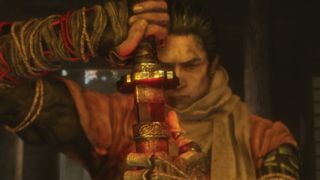

This article first appeared in PC Gamer magazine issue 357 in June 2021. Every month we run exclusive features exploring the world of PC gaming—from behind-the-scenes previews, to incredible community stories, to fascinating interviews, and more.
The PCG team once again gathers around a hypothetical campfire to trade their latest tales from the videogame landscape. James tells of the enlightenment he received when playing Skeiro for the second time, Robin rejects all forms of capitalism in Legend of Grimrock, Steven grapples with Loop Hero's obtuse yet fascinating story, and Matt finds out how roleplaying an angsty booze-soaked detective in Disco Elysium can work as a tool for self-confidence. Enjoy!
Sekiro: Shadows Die Twice goes down much smoother the second time around—James Davenport
For the last year or so, I've only associated Sekiro with frustration and anxiety. I wrote about beating the final boss using a slow-motion mod when Sekiro released, which led to dozens of death threats in the inbox and mentions, and to a meme big enough to make the news all over the internet, from Vice to the BBC. The voice actor for Liquid Snake, Sonic the Hedgehog, and the XCOM commander all chimed in with takes on the thing. "You not only cheated yourself..."
It was funny in retrospect, but not while in the eye of the hurricane. I didn't touch Sekiro after that. Until now, at least. I've been inside for a year. The Snyder Cut exists. Actual Elden Ring footage leaked. Anything is possible, so I might as well try to reconnect with Sekiro.
I'm realising that I've always loved Sekiro, I only thought the last boss was bullshit. I still do, but the journey there is a blast, and even better once you've subjected yourself to the misery tax Sekiro demands up front in order to learn how it works.
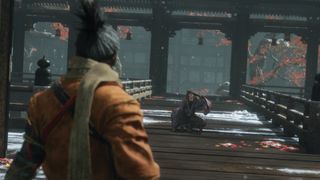
The initial hours leading up to and including the first bout with Genichiro feel like a different game with a clear understanding of Sekiro's swordplay. Because I've already rejected my Dark Souls instincts, I'm clearing arenas without much issue. Parry timing is baked into my brain with most enemies, and I'm better able to oscillate between stealthy and aggressive play. It's odd, really, because Sekiro is the most forgiving From Software game 80% of the time. There's not a single non-boss encounter you can't just run away from for a quick mental reset, and after you've proved your mettle you can just grapple hook through the whole damn game. Sekiro isn't an elegant teacher, but forcing yourself into basic competency reframes the whole experience.
Some highlights from Sekiro, Round 2: the ape fight is now my favourite. I'm no longer pissed about the surprise second form. I can also finally parry lightning, which made Genichiro's final form a much cooler, smoother affair. Ingesting Sekiro's combat vocabulary takes time, but little in games feels better than building up that demonstrable instinct. My favourite a-ha moment was noting that the Okami people were weak to poison in a tidbit of item description, then testing the Sabimaru attachment to trivialise every fight with them.
I'm also better able to appreciate the narrative this time around. Having already pieced together the basic story, I can pay more attention to the details now, and there's a lot to appreciate. I know who Tomoe is and see signs of her history everywhere. A shame we didn't get to see that story told in DLC or comic book form. My renewed fascination set me off on a VaatiVidya lore video bender, watching every one of his Sekiro story summaries and character-focused videos in a single session.
The biggest gaming news, reviews and hardware deals
Keep up to date with the most important stories and the best deals, as picked by the PC Gamer team.
The only thing left to do? Take down the final boss. Wish me luck.
Rejecting capitalism in Legend of Grimrock 2—Robin Valentine
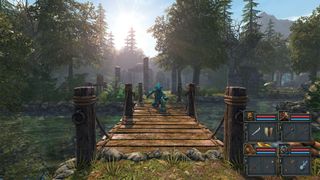
RPGs trend towards bloat. People want bigger worlds, more stuff, greater choice. But as in any genre, the things that are missing can end up defining the experience far more than what's there.
After adoring the first game, I've finally recently dived into Legend of Grimrock 2, and it's reminded me of one of my favourite absences in gaming: neither game has any merchants. In fact, they have no commerce at all. You can't trade or barter. There isn't even any money. Any gold or jewels you do find are just dead weight—if you can drag them to the end of the game, you'll earn an achievement, but really they serve no function.
That's got to be almost unique among RPGs—I struggle to think of another without any means at all of buying or selling goods. And it deftly solves a classic problem almost all RPGs have: hoarding.
We've all been there—you're travelling the lands, recruiting companions and vanquishing evil, and it's all very exciting, but you just can't help bogging down your quest by picking up absolutely everything in sight. As you hit space limits or your weight capacity, you have to trudge back to town to sell all your pointless gubbins, usually inflating your gold supply to the point where money becomes meaningless before the game is over. Crafting systems only make the compulsion worse, imbuing every piece of detritus in the environment with a dangerous sort of potential. 'But what if I need it later?'
In the world of Grimrock, the only potential anything has is in helping you to survive right now. Is this axe better than your current one? No? Then its only worth is as a heavy object to hold down a pressure plate. It might have beautiful gold inlay, and be the only one of its kind in the entire game, but if you can't eat it then it's junk.
Everything only has the value you give it, and it's amazing how freeing that is. I leave a trail of shields, helmets, and swords in my wake, and I never have to give any of them a second thought. Instead I save my limited inventory space for the things I truly treasure. Like a stack of pebbles I can use to solve all manner of puzzles, or a piece of cheese for my ratman leader to scoff later, or an old scroll with a useful potion recipe on it. For once I'm not a hoarder—I'm a survivor.
Loop Hero is a retro card-battling RPG that's as obtuse as it is fascinating—Steven Messner
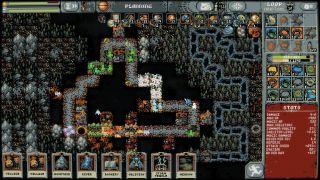
Retro indie games are too common these days, but it's rare to find one that so bravely—and resolutely—clings to the past. Sure, throwbacks like Hyper Light Drifter or Celeste evoke games of bygone eras, but they mix that together with a ton of very modern design and graphical features. But Loop Hero doesn't just echo games of yore, it feels like a long-lost relic. To put it bluntly: this shit is old school.
The idea is brilliant in its simplicity: you play an adventurer who survived an apocalyptic event in which an evil lich erased the world. To restore everything, you walk along a barren loop of road fighting monsters. Sometimes these monsters drop cards, which you can then place either on the road, beside it, or somewhere off in the inky nothingness that surrounds you. Placing a Swamp card, for example, means mosquitos will begin to spawn on that tile next time I pass through. I might earn some equipment from killing one or some nice resources, or maybe I'll just die and lose everything and have to start building my loop again from the beginning.
It's a little bit like if Slay the Spire and some clicker games had a baby.
It's a little bit like if the deck-building roguelike Slay the Spire and some clicker games had a baby. Instead of actively controlling your hero, they just march ever onward and fight entirely of their own volition. Your mission is to walk a fine line where they fight ever-more challenging monsters while still earning enough loot to boost their stats so that they can survive each fight. Sitting back and watching this all unfold and occasionally playing new cards or equipping new gear sounds boring, and yet I found myself 50 hours in with no plans to stop—I'm enjoying it that much. Going in circles has never been this much fun.
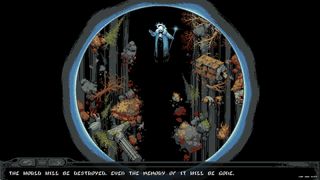
What makes Loop Hero so tantalising, though, is how mysterious it all is. Almost nothing is explained, so it's my job to experiment and find ways to game the system in my favour. There's a ton of secret interactions that can unlock all sorts of powerful (or fatal) side-effects. Drop a Vampire Mansion right next to a Village, and instead of healing you the villagers will all be turned into nasty ghouls for a few laps. Eventually, though, the villagers and vampires will settle into a symbiotic relationship which means the village now heals much more HP than it ever did before. Uncovering all of these secret tricks is deeply satisfying. There were frustrating times where it felt like I couldn't survive more than a few laps around the map, but I've now mastered the game to the point where I can beat its toughest bosses and return to my main base loaded with treasure.
It's been a while since I overcame a game like that. And it harkens back to an era when games weren't so eager to please or help the player. Loop Hero is so confident in what it does well that it doesn't need to explain itself. That may turn off a lot of people. But Loop Hero is an enigma that's been a joy to unwrap.
Can Disco Elysium work as a tool for developing self-confidence?—Matt Elliot
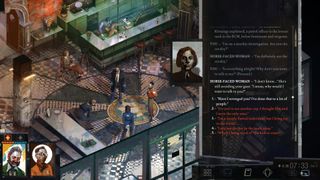
I'm sorry about my first playthrough of Disco Elysium. So sorry, in fact, that the game branded me 'Sorry Cop'—the human equivalent of a Hallmark sympathy card. I spent the first hours of the game trying to make up for all the awful things my character probably did, without really knowing what they were, in a haze of post-booze self-loathing that felt entirely too much like innumerable Sunday mornings. But this time it's going to be different. I'm going to live life (or play Disco Elysium) without boundaries. I'll pick the most confident option even if it leads to results that nobody desires. Nothing says 'assertiveness' like choosing things based on how much other people don't want me to have them.
The first example of this manifests as me finding a woman's missing husband. Except he's not missing and she doesn't want me to find him. But the new, assertive me insists she does, so I keep pushing, only to discover that he actually is missing and she sort-of wants me to track him down. This is the proof I didn't need that brazen self confidence always leads to positive results and I can't envision a single circumstance where this won't be the case. That's the sort of thing old me would worry about. New me doesn't worry about anything except not worrying.
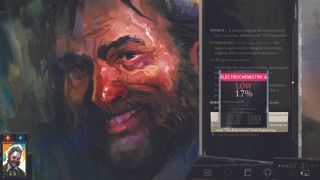
My thrusting self-confidence manifests elsewhere. I decide to find out what my heraldic bird is and conclude it must be a Major Majestic cockatoo. A normal cockatoo just wouldn't cut it. I try to fix the broken tap in my bedroom with chain cutters so I can better see my reflection—and then I even fix the expression on my face as well. (We'll skip over the bit that says I look like a sad, old man. A sad, confident old man.) It's not enough. My eruption of self-improvement needs structure, so I buy a map. Something, despite being over 40 hours into the game, I'm yet to do. This lets me tick off specific tasks Useless Former Me left unfinished. I lift barbells and get discounts on key items in the pawn shop. I don't worry about how people will react. It's a revelation. My only regret is the hours I spent worrying about other people's feelings.
And then Disco Elysium ruins it. I find a lifeless body on a boardwalk. A man who died drunk and alone. And the hard-to-spin-into-an-inspiring- story news is that it's the husband of the woman I was talking to earlier. Telling her about his death is genuinely touching and sad, and had the game even offered a brassy, swaggering way to break the news, I'm not sure I'd have taken it. It's a moment that makes me wish I'd put fewer points into empathy in real life—but I'm more glad than ever I've got them in Disco Elysium. Thank you for coming to my TED Talk.
James is stuck in an endless loop, playing the Dark Souls games on repeat until Elden Ring and Silksong set him free. He's a truffle pig for indie horror and weird FPS games too, seeking out games that actively hurt to play. Otherwise he's wandering Austin, identifying mushrooms and doodling grackles.

Genshin Impact's missing English voice acting returns in its latest trailer, but players aren't sure if they should celebrate yet

Palworld developer reports Nintendo's suing over 3 Pokémon patents for only $66,000 in damages, but a videogame IP lawyer says fighting the lawsuit could mean 'burning millions of dollars'
Most Popular

